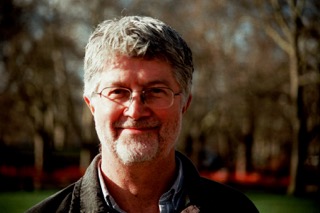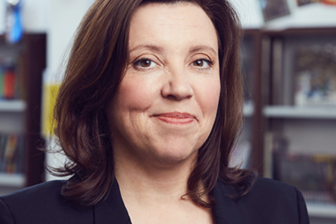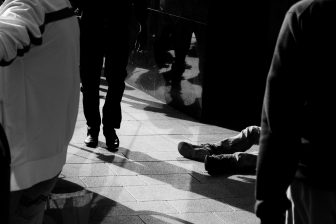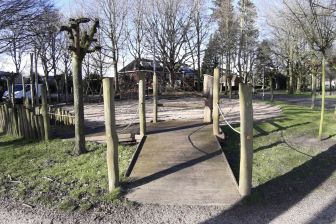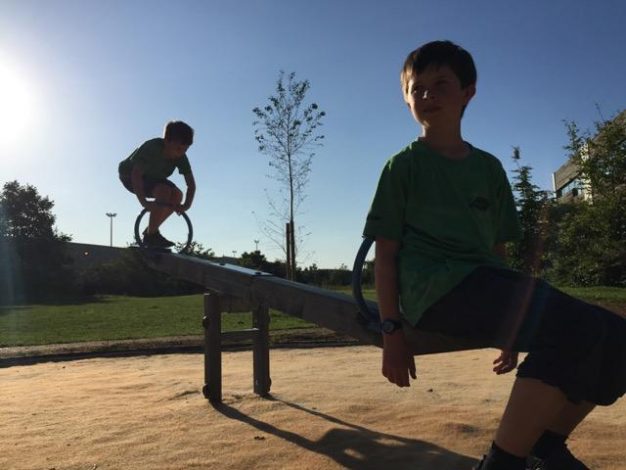
Interview with author of Policy for Play, Adrian Voce
In this interview, author of Policy for Play, Adrian Voce talks about his career in playwork and why campaigning for children’s right to play is so important. After many years as a playworker, campaigner and now writer, Adrian Voce is, above all, a passionate advocate for children’s play, described in ‘Policy for Play’ as children’s ‘forgotten right’.
Career-wise, Adrian recalls how, before he became a parent, he felt fortunate to be working on adventure playgrounds: “my working life was a kind of reverse of the norm. Most other people went home to their families at the end of the day. I used to get the feeling I was coming home each time I went to work!”
Adrian definitely regards himself ‘more as a playworker than a childcare worker’; believing childcare is primarily for parents and employers, while authentic playwork settings are for children and their play. Explaining why he loves playwork, he says: “I think children playing…are as vibrant and alive as humanity gets. It always felt a huge privilege to be in that world”. Of his campaigning work since, he says, “I am driven by the need to help create [play] opportunities for children who may not otherwise have them.”
Playwork approach
Describing an inspirational moment from his career reveals what Adrian sees as a key to the playwork approach: “I worked as a special needs assistant, supporting a boy with mobility difficulties to be in a mainstream school. He was a normal little boy with a love of play and sport, and a really competitive nature. But his legs didn’t work well; he spent a lot of time on his hands and knees, a great crawler!
“Although working in school, I was still a playworker and wanted to intervene as little as necessary to enable him to be part of the class. One sports day in Year 2, he lined up for a beanbag race between two teams. When it was his turn, the boy lined up against him, when he saw who he was up against, without any cue from the adults or other kids, just instinctively dropped to his hands and knees so that they could have a fair race. It was a beautiful moment. We talk about ‘special needs’, but nothing is more special for a child than just being included and accepted by their peers’.
OBE award for being dedicated campaigner
As a respected consultant on public provision for children’s play and the founding director of Play England, Adrian, who in 2011 received an OBE for his efforts, is a dedicated campaigner – so look away now if you are unnerved by forthright opinions expressed by a committed children’s activist –
On playwork:
“I’d like to see playwork recognised as a core skill-set, required for all early years and after school settings; this would help to reverse the insidious institutionalisation of childhood: a result of our obsession with a very narrow measure of education.”
On schools and childcare:
“Rather than focusing on children being school-ready, it’s time we asked whether schools and childcare are really children-ready.”
On parents and risk:
“The message [parents] often get is that they are over-protective, paranoid even, for being wary to let their children out, or take part in ‘risky play’. I think this is patronising. What is ‘risky play’ any way? It’s not a recognised play type and does not sound like something I would like my children to be doing! I think it’s an ill-advised label for a sensible, professional approach to managing risks, which recognises children need to encounter and manage some risks for themselves.
It’s true that denying children freedom to explore the world on its own terms is not really keeping them safe, but rather protecting ourselves from our own anxiety. As playworkers we do need to counter this, but some of the risks parents are concerned about, such as traffic, are real.
If we want parents to allow their children more freedom to play outside, there is a wider responsibility to make the public realm safer – and seen to be safer – for children.”
On good play spaces:
“I think children should be in supportive environments where they feel safe and secure enough to be themselves … to explore, invent, manipulate and discover. [They should have] access to the natural elements, a wide range of loose parts and materials … and opportunities to climb, hide, build, jump, balance, swing and all the other things a playful child wants to do … their playful nature will do the rest.”
Play Strategy for England
Paradise Lost…
During the years 2004-10, the campaign led by Adrian and his colleagues achieved a major breakthrough in play policy, which then became a roller-coaster ride, as the financial crash and change of government brought it to a premature halt:
“Our work in the noughties led to the Play Strategy for England, an ambitious 10-year plan, with many different elements, that was designed to make England the best country in the world for children’s play. Seeing this scrapped after only two years by people who did not even understand it, was pretty tough …”
Finally, Adrian’s advice to anyone considering a career in childcare or, especially, playwork, is predictably upbeat and enthusiastic:
“Go for it! Working with children is the most enjoyable way to make a living that I’ve ever experienced. Be real, don’t patronise them … they will respond to that and reward you with absolute trust, and a huge amount of fun … I think children need that feeling of a safe place, where they can be themselves and know that they are OK, no matter what. I think a good playworker (childcare worker, teacher) gives them that.”
This article has been adopted from an interview with Adrian Voce by David Williams, which first appeared on First Discoverers
